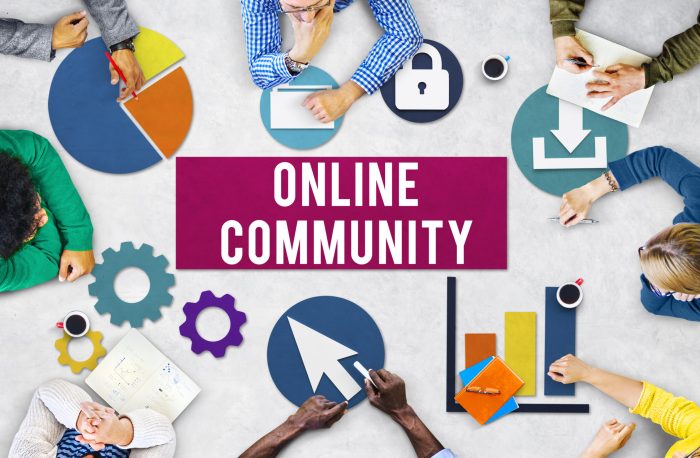Building Online Community Engagement is more than just a trend—it’s a vital component for businesses looking to thrive in the digital age. From creating compelling content to fostering two-way communication, this topic delves into the heart of cultivating thriving online communities.
Get ready to explore the dynamic world of online engagement where authenticity and relationship-building take center stage.
Importance of Building Online Community Engagement

Building online community engagement is crucial for businesses in today’s digital age. It allows companies to connect with their customers on a more personal level, create brand loyalty, and increase customer retention rates. By fostering a strong online community, businesses can gain valuable insights, feedback, and support from their customers, leading to improved products and services.
Examples of Successful Online Communities
- The Sephora Beauty Insider Community: Sephora’s online community allows beauty enthusiasts to connect, share tips, and discuss products. This has led to increased brand loyalty and customer engagement, with members feeling a sense of belonging and exclusivity.
- The LEGO Ideas Platform: LEGO’s online community enables fans to submit their own ideas for new LEGO sets, vote on designs, and interact with fellow enthusiasts. This has not only strengthened the brand’s relationship with customers but also led to the creation of successful new products based on user-generated content.
Benefits of Fostering a Strong Online Community
- Increased Brand Loyalty: Engaging with customers in an online community helps build trust and loyalty towards the brand, leading to repeat purchases and positive word-of-mouth marketing.
- Enhanced Customer Retention: By providing a platform for customers to interact with each other and with the brand, businesses can keep their audience engaged and invested in the community, reducing churn rates and increasing customer lifetime value.
- Valuable Feedback and Insights: Online communities provide a direct line of communication with customers, allowing businesses to gather feedback, suggestions, and insights that can inform product development, marketing strategies, and overall business decisions.
Strategies for Increasing Online Community Engagement
To increase online community engagement, it is essential to create content that is not only informative but also engaging. Here are some tips on how to attract community members through compelling content:
Create Engaging Content
- Use a variety of content formats such as videos, infographics, and polls to keep your audience interested.
- Write in a conversational tone to connect with your community on a personal level.
- Ask questions and encourage discussions to foster interaction among community members.
- Provide valuable and relevant information that addresses the needs and interests of your audience.
Role of Social Media
- Utilize social media platforms to reach a larger audience and drive traffic to your online community.
- Engage with your followers by responding to comments, messages, and mentions in a timely manner.
- Share user-generated content to showcase the involvement and contributions of community members.
- Use social media analytics to track engagement metrics and optimize your content strategy accordingly.
Responding to Community Feedback
- Acknowledge feedback, whether positive or negative, to show that you value the opinions of your community members.
- Address concerns and resolve issues promptly to maintain trust and credibility within the community.
- Encourage constructive feedback by creating a safe space for open communication and dialogue.
- Show appreciation for feedback by thanking community members for their input and participation.
Tools and Platforms for Managing Online Communities

When it comes to managing online communities, having the right tools and platforms can make a huge difference in ensuring engagement and growth. Let’s take a look at some of the popular options available and how they can help streamline community management processes.
Comparing Online Community Platforms and Features
- Facebook Groups: One of the most widely used platforms for building online communities. It offers features like group insights, scheduled posts, and event creation.
- Discord: Known for its real-time communication capabilities, Discord provides voice chat, video chat, and various moderation tools for community management.
- Reddit: A platform with a strong focus on discussion and content sharing. Subreddits allow users to create niche communities based on specific interests.
Utilizing Automation Tools for Community Management
- Buffer: Helps in scheduling social media posts and analyzing their performance, saving time and effort for community managers.
- Hootsuite: Allows for monitoring multiple social media accounts, engaging with followers, and tracking analytics from a single dashboard.
- Zapier: Enables automation of tasks between different apps, streamlining processes and increasing efficiency in managing online communities.
Importance of Analytics in Measuring Online Community Engagement
Analytics play a crucial role in understanding the impact of online community efforts and making informed decisions for growth.
Tracking metrics like user engagement, click-through rates, and conversion rates can provide valuable insights into the health of the community.
- Google Analytics: Offers in-depth data on website traffic, user behavior, and conversions, helping in measuring the effectiveness of community engagement strategies.
- Social Media Insights: Platforms like Facebook, Twitter, and Instagram provide analytics tools to track post performance, audience demographics, and engagement levels.
Building Trust and Relationships within Online Communities
Building trust and relationships within online communities is crucial for fostering a sense of belonging and loyalty among members. Establishing a strong foundation of trust can lead to increased engagement and collaboration, ultimately driving the success of the community.
Strategies for Building Trust among Community Members
- Encourage open communication and active participation from all members.
- Set clear expectations and guidelines to ensure transparency and accountability.
- Show appreciation for contributions and feedback to build a positive atmosphere.
- Address conflicts or issues promptly and fairly to maintain trust among members.
Importance of Transparency and Authenticity in Online Community Engagement
- Transparency helps build credibility and trust, showcasing honesty and integrity within the community.
- Authenticity fosters genuine connections and relationships, leading to long-term engagement and loyalty.
- Being transparent about decisions, processes, and goals ensures members feel informed and valued.
Examples of Successful Community-Building Initiatives, Building Online Community Engagement
-
Reddit’s “Ask Me Anything” (AMA) sessions
where public figures and experts engage directly with the community, building trust through open dialogue.
-
Facebook Groups
that provide a platform for like-minded individuals to connect and share experiences, fostering relationships through shared interests.
-
LinkedIn’s Influencer Program
that features industry leaders sharing insights and engaging with professionals, creating a trusted network within the platform.






